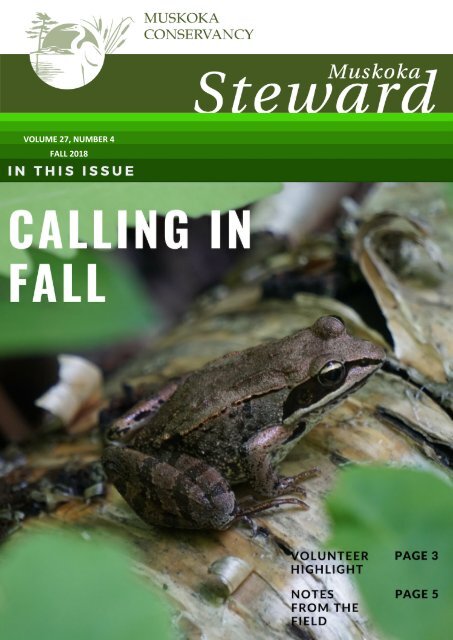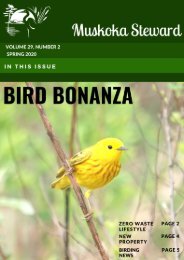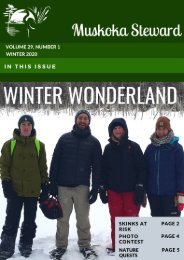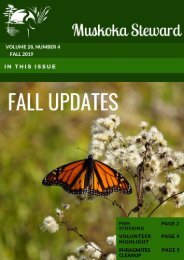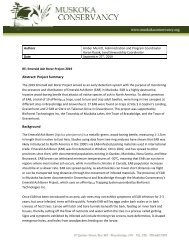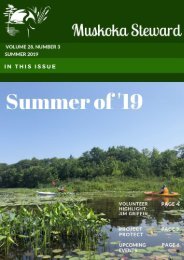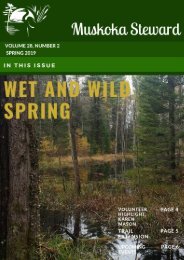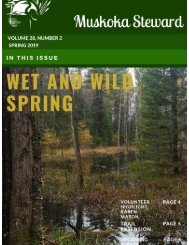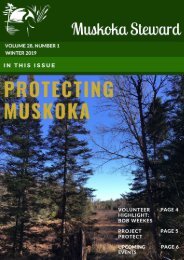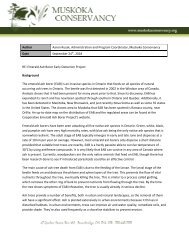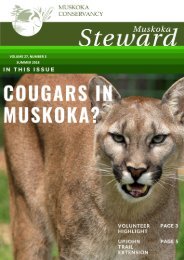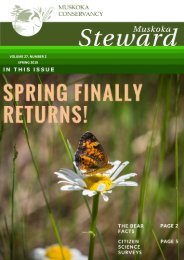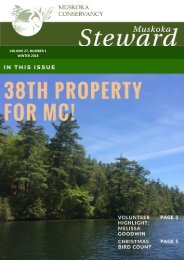November 2018 - Final
Create successful ePaper yourself
Turn your PDF publications into a flip-book with our unique Google optimized e-Paper software.
VOLUME 27, NUMBER 4<br />
FALL <strong>2018</strong>
Almost everyone in Muskoka is<br />
used to the springtime sound of<br />
a chorus of frogs. Spring peepers<br />
and Wood frogs start the earliest,<br />
with American bullfrogs and<br />
Green frogs closing out the chorus<br />
in the late spring and early<br />
summer. However, there’s another<br />
chorus, one in the fall,<br />
which seems to not serve a specific<br />
purpose. The frogs are done<br />
with their breeding season and<br />
the main reason for calling is to<br />
attract mates. So why this late<br />
fall call?<br />
I’m sure that many a birder has<br />
noticed these fall frog songs and spent the next thirty<br />
minutes searching for a mystery bird that just doesn’t<br />
show it’s face. I know I have. In fact, that’s the main reason<br />
I even noticed the phenomenon. It took a significant<br />
amount of time for me to realize that my mystery bird<br />
was really just a Spring peeper. I’ve also heard Wood<br />
frogs calling as well, though their call is a bit easier to distinguish<br />
from a bird’s. There are a couple schools of<br />
thought as to why this late fall calling phenomenon occurs.<br />
Why Do Frogs Call in Fall?<br />
One potential reason is the length of the photo-period, or<br />
the length of the day. Spring and fall have a similar photoperiod,<br />
which may trigger a calling behavior in frogs. Additionally,<br />
temperatures and even sometimes weather<br />
can be similar between the two seasons. So even though<br />
breeding is completely over, the similar temperatures and<br />
length of day may elicit a song from a frog. Earlier this<br />
year, we had a Spring peeper calling from the small pond<br />
in our backyard. A bit later, the pond was ransacked in<br />
the night by some creature and we didn’t hear the peeper<br />
again. And then, one cooler night in the fall, lo and behold,<br />
the peeper began to call again. Maybe those temperature<br />
changes are enough to bring the frogs’ voices<br />
back to life.<br />
There is another theory that also holds some weight.<br />
Frogs survive the winter through production of antifreeze<br />
compounds in the blood. This keeps them from<br />
freezing completely and allows them to last through cold<br />
winters with little trouble. Because they are effectively<br />
frozen, their bodies need to be ready for whatever is on<br />
the other side of that winter. And by ‘skipping’ winter,<br />
their next big event is their breeding season. This other<br />
theory suggests that because of the short time between<br />
fall and spring for frogs, early fall calling is just a sign of<br />
them getting ready for calling in the spring. A warm up<br />
before they freeze if you may.<br />
We’re still not quite sure the exact reasons behind this<br />
strange event and it’s possible that a conclusion may<br />
never be reached. However, even if we don’t know the<br />
scientific reasons behind the fall chorus, hearing frogs<br />
that last time before settling into winter is always a welcome<br />
experience.<br />
Aaron Rusak<br />
2019 Membership Renewal<br />
Our 2019 membership renewal has been mailed out.<br />
You should be receiving the letter shortly, if you haven’t<br />
already. If it doesn’t come, remember that there<br />
has been a rotating postal strike on, so it may take an<br />
extra couple of days. If you have any questions, or<br />
haven’t received it, be sure to call the office at 705-<br />
645-7393.
A message from our Executive Director<br />
INVESTORS WANTED for Woodpecker Ranch<br />
Low maintenance. High return.<br />
Call (705) 645-7393.<br />
According to Hinterland Who’s Who, a pair of Downy<br />
woodpeckers can do a thorough job of ridding an infested<br />
tree of insects over a single winter. “With its sharp<br />
bill boring small round holes or prying open the insects’<br />
hiding places, the woodpecker fetches out food with its<br />
long agile tongue.” The Downy is just one of four commonly<br />
observed woodpeckers in Muskoka. The others<br />
being Pileated, Hairy, and the Yellow-bellied sapsucker.<br />
We know there are several different choices when it<br />
comes to managing for pests. In the case of EAB, some<br />
decide on tree removal, others will opt for pesticide.<br />
There’s a role for education, as the insects travel well on<br />
firewood (simple message: find a local source for firewood).<br />
But it turns out, the simplest natural solution<br />
could also be the least expensive.<br />
Muskoka still has pretty decent healthy natural forests,<br />
and it turns out these have a role to play in protecting<br />
Muskoka against the EAB. That’s because a forest is<br />
home to woodpeckers.<br />
Why is that important?<br />
Emerald Ash borer (EAB), is wiping out millions of trees in<br />
southern Ontario. In 2017, TV Ontario reported that the<br />
City of Guelph was going to spend $8-million and Toronto<br />
$75-million to fight the infestations. Crazy southerners,<br />
you say? Thunder Bay, bastion of northern sensibility,<br />
and one of the most recently EAB-infested communities,<br />
has pledged $6.3 million over 10 years to treat 4,600 ash<br />
trees and remove many more. (tvo.org/article/currentaffairs/across-ontario-the-emerald-ash-borer-is-eatingup-trees--and-municipal-budgets).<br />
Muskoka Conservancy, in partnership with the Towns of<br />
Bracebridge and Gravenhurst, and a company called Bioforest<br />
Inc. has been setting EAB traps in Muskoka Ash<br />
trees for the past three years. In the summer of <strong>2018</strong>, for<br />
the first time, we trapped two Emerald Ash borers (EAB).<br />
This is serious, but it’s only two bugs. Let’s not set our<br />
collective hair on fire.<br />
“Woodpeckers may not be able to snuff them out, but<br />
they may be able to control them,” said Christopher<br />
Whelan, an avian ecologist with the Illinois Natural History<br />
Survey.<br />
According Charles Flower, postdoctoral research associate<br />
in biology at University of Illinois Chicago, Woodpeckers<br />
are “…a native predator that is able to detect and<br />
respond to this new rich food resource.” (today.uic.edu/<br />
emerald-ash-borer-problem-solved)<br />
To put it into non-scientific lingo, woodpeckers are the<br />
aardvark of the skies!<br />
Muskoka Conservancy protects 39 conservation properties,<br />
most of them are forested, and home to woodpeckers.<br />
That means we all are Woodpecker ranchers, and we<br />
could sure use another Woodpecker ranch or two if<br />
we’re going to beat the Emerald Ash borer.<br />
Invest today!<br />
Scott Young<br />
Volunteer Highlight: Allyn Abbott<br />
Allyn Abbott was recently honoured at the Ontario Land Trust Alliance<br />
<strong>2018</strong> Gathering when she received the Angus McLeod Vision award.<br />
Allyn is an outstanding volunteer with Muskoka Conservancy and has<br />
been both a director and a past president of the board. Allyn has been<br />
dedicated to the land trust movement for more than 14 years. Allyn has a<br />
clear joy and passion for nature, which is easy to see when working with<br />
her in the field. She’s not afraid of getting a bit dirty to investigate an interesting<br />
species or survey a new property.<br />
Allyn has been an incredibly important asset to Muskoka Conservancy, as<br />
both a director and a past president. She oversaw the merger that formed<br />
the Muskoka Conservancy we see today and also managed to take on five<br />
new conservation properties in that period. Even after retiring from the<br />
presidency, she still works tirelessly to advance Muskoka Conservancy as a<br />
land trust. She has taken part in acquiring most, if not all, of our 39 conservation<br />
properties and has offered huge assistance in a number of our<br />
largest fundraisers.<br />
Everyone here at Muskoka Conservancy would like to thank Allyn for her<br />
momentous contributions to our organization and her dedication to protecting<br />
natural areas in Muskoka.
Fall Birding Nature Quest<br />
This September saw the return of our fall birding nature<br />
quest. This nature quest focuses on the fall migration and<br />
identifying the fall plumages of various bird species as they<br />
pass through Muskoka. On September 16th, participants<br />
headed out to Henry Marsh early in the morning, to look<br />
at the species both at Henry Marsh and Muskoka Conservancy’s<br />
Bert Cross Family Nature Reserve. Lead by Aaron<br />
Rusak and Dale Wenger, the group managed to see 29<br />
species in total.<br />
Although the morning started out a bit chilly and foggy,<br />
the sun quickly came out and brought out the migrating<br />
birds. Some of the highlights of the trip were a Semipalmated<br />
plover, a Philadelphia vireo, and a pair of Palm warblers.<br />
All participants were thrilled and excited to add new<br />
species to their life lists.<br />
Our Nature Quest program runs a variety of outdoor activities,<br />
with events happening once a month. In the past<br />
we’ve done paddling outings, vernal pool exploration, and<br />
just general walk or skis in nature. For more information<br />
on our upcoming Nature Quests call the Muskoka Conservancy<br />
at 705-645-7393 ext 200 or email<br />
info@muskokaconservancy.org.<br />
Aaron Rusak<br />
Little Sprouts Update<br />
The Little Sprouts are nearing the end of their 3rd full year<br />
as eco-club stewards. The group has now grown to include<br />
440 online members and brings a crowd of kids and parents<br />
to each monthly outing.<br />
In <strong>November</strong>, the Sprouts are teaming up with Muskoka<br />
Yarn Connection to participate in a sold out workshop<br />
where they will learn to make wool animals. This event is<br />
possible from the ongoing support of the Bracebridge Muskoka<br />
Lakes Rotary Club who have sponsored the Little<br />
Sprouts for <strong>2018</strong>. In December the group is planning an<br />
outdoor fun day over the holidays to take a nature break<br />
from all the holiday festivities and enjoy the fresh air (and<br />
hopefully snow!). We are looking forward to 2019 and a<br />
year of collaborating with other community groups to offer<br />
more environmentally fun and educational experiences for<br />
these inquisitive kids!<br />
Christina Hunter
Notes from the Field<br />
Now that we’re into the fall, the monitoring of<br />
our Muskoka Conservancy has all but wrapped<br />
up. The field season has left us with some exciting<br />
photos to share with our members. If you’re<br />
interested in assisting with property monitoring<br />
in the new year, give the office a call at 705-645-<br />
7393 or email us at<br />
info@muskokaconservancy.org.<br />
Aaron Rusak<br />
Green Heron, Muskoka Delta Nature<br />
Reserve<br />
Turkey tail, Aufheben Nature Reserve<br />
Eastern Phoebe nest, Waddis Creek Conservation<br />
Easement<br />
Raccoon, Darker Conservation Easement<br />
Katydid, Browning Island Nature Reserve
Muskoka Conservancy has an<br />
online shop!<br />
With our website update, we’ve<br />
added ecommerce functionality to<br />
our online shop. This means that<br />
you can get your favourite Muskoka<br />
Conservancy gear and gifts without<br />
having to leave your home!<br />
Check out our online shop at muskokaconservancy.org/shop<br />
If you want to buy your items the<br />
good old fashioned way (or just<br />
want to see one of our faces),<br />
you’re welcome to come into our<br />
office at 47 Quebec Street and see<br />
the items in person. Or, for those of<br />
you in Toronto, contact Elizabeth<br />
Mason at (416) 924-4868 for all<br />
your MC needs.<br />
A big thank you!<br />
Muskoka Conservancy would<br />
like to thank Windermere Garden<br />
Too, Rosseau General Store,<br />
and Indian River Trading Company<br />
for stocking our products<br />
this summer! You can go there<br />
to get frisbees, tea towels, and<br />
other merchandise!<br />
Thank you to our official partners!<br />
MUSKOKA CONSERVANCY OFFICERS<br />
PRESIDENT MARGARET MCLAREN<br />
PAST PRESIDENT JOHN BURTON<br />
VICE PRESIDENT NORM MOFFAT<br />
TREASURER MIKE EVANS<br />
DIRECTORS<br />
ALLYN ABBOTT BOB WEEKES ROB MCLENNAN<br />
ELSPETH WOOD CYNTHIA SMITH RICHARD ONLEY<br />
CHRISTINA HUNTER<br />
HONORARY DIRECTORS<br />
RUSS BLACK JOHN FINLEY ELIZA NEVIN<br />
WILLIAM CLARK PETER GOERING ROB PURVES<br />
BILL DICKINSON ELIZABETH MASON GEORGE SNIDER<br />
MUSKOKA CONSERVANCY STAFF<br />
EXECUTIVE DIRECTOR<br />
ADMINISTRATION AND PROGRAM<br />
COORDINATOR<br />
SCOTT YOUNG<br />
AARON RUSAK


